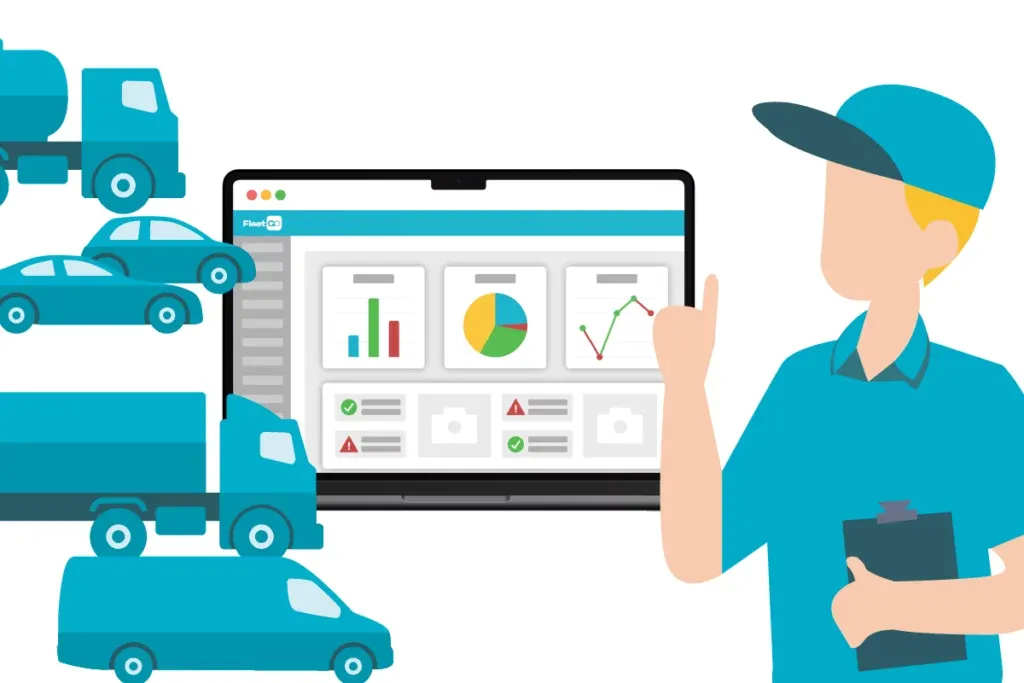Fleet management is an essential aspect of any business that relies on transportation to deliver goods or services. The person responsible for managing a fleet of vehicles is known as a fleet manager, and this can be quite challenging, as they are responsible for managing a range of tasks. These tasks range from maintaining vehicles to managing drivers and scheduling routes. This article explores fleet manager meaning, responsibilities, the skills required to be successful in the role and the benefits of effective fleet management.
What is a Fleet Manager?
Fleet managers are responsible for the management and coordination of a company’s fleet of vehicles, which could include cars, vans, trucks or buses. Their primary focus is to ensure the fleet is operating efficiently, safely and cost-effectively. A vehicle fleet manager may work in a variety of industries and typically reports to a higher-level manager or director within the organisation.

Fleet managers play a crucial role in managing the costs associated with running a fleet. These tasks include managing expenses, including vehicle maintenance, fuel costs, insurance premiums and other expenses related to fleet operations. Thus, a fleet manager must have a strong understanding of budgeting and financial management to ensure that the fleet is operating within budgetary constraints and that costs are kept under control.
What Does a Fleet Manager Do?
The responsibilities of a fleet manager can vary depending on the size of the fleet, the industry and the company’s objectives. However, there are many common responsibilities that fleet manager jobs of all types will typically include:
Vehicle maintenance
The safety of drivers and the public is of utmost importance in any transportation-related business. A fleet maintenance manager plays a critical role in ensuring that all vehicles in the fleet are in good working condition. This involves regular maintenance, inspections, such as a walk-around check, and repairs to identify and address any issues before they develop into bigger problems. By keeping the vehicles well-maintained, fleet managers can reduce the risk of accidents, breakdowns and other issues that can disrupt operations and put drivers and the public at risk.
Inspections can help identify any issues that may not be immediately apparent during routine maintenance. These inspections can be conducted by the fleet manager or a trained technician. They should be done at regular intervals to identify any potential problems before they become a safety hazard.
Fuel management
Fuel is one of the most significant expenses associated with operating a fleet, and fleet managers are responsible for managing fuel costs to ensure that the fleet is operating cost-effectively. Managing fuel costs involves several tasks, including tracking fuel usage, implementing fuel-efficient driving practices and negotiating with fuel vendors to get the best possible prices.
Implementing fuel-efficient driving practices is an effective way for fleet managers to manage fuel costs. This may include training drivers to use fuel-efficient driving techniques like maintaining a steady speed and avoiding rapid acceleration and braking. By promoting fuel-efficient driving practices, fleet managers can reduce fuel consumption and overall fuel costs.
Driver management
One of the primary responsibilities of fleet managers is to ensure that drivers have the necessary licenses, certifications and training to operate the vehicles safely. This may involve verifying that each driver has the appropriate driver’s license for the type of vehicle they will be operating and ensuring that drivers have completed any necessary training or certification programmes, if applicable.
Fleet managers are also responsible for promoting safe driving habits among their drivers. Drivers may need training on safe driving practices, such as maintaining a safe following distance, avoiding distractions while driving and adhering to speed limits. Monitoring driver behaviour is another factor, with speeding or aggressive driving being things to look out for and address.
Route planning
To plan the most efficient routes, fleet managers may use GPS and other fleet tracking software to optimise routes and ensure timely deliveries. These tools can help fleet managers to identify the shortest and fastest routes, avoid traffic congestion and reroute drivers if necessary due to traffic, accidents or other unforeseen circumstances.
In addition to planning routes, fleet managers must also consider the delivery deadlines for each shipment. They must ensure that drivers can complete their routes within the required timeframe and take steps to address any issues that may arise. For example, fleet managers may adjust routes or delivery schedules to ensure that drivers can meet delivery deadlines, or they may work with customers to establish more flexible delivery schedules.
Compliance
Fleet managers have a critical responsibility to ensure that their fleet is compliant with all applicable laws and regulations. Failure to comply with these regulations can result in fines, legal issues and reputational damage to the company. Fleet compliance managers must remain up-to-date with the latest regulations and work closely with their drivers and other staff members to ensure compliance.
Another area of compliance that fleet managers must address is vehicle emissions standards. Many regions have specific regulations related to vehicle emissions, and fleet managers must ensure that their vehicles meet these standards when travelling through those regions.
How to Become a Fleet Manager
Becoming a fleet manager typically requires a combination of education, experience and skills. A bachelor’s degree in a related field, such as business administration, logistics or transportation management, is often preferred by employers. However, some companies may accept candidates with relevant work experience in lieu of fleet manager qualifications. Having a degree often leads to a higher fleet manager salary and improves the chances of progression into a position such as fleet operations manager.
Fleet managers must also have excellent communication, analytical, organisational and leadership skills to be successful. Continuing education and professional development opportunities, such as certification programs, can also be beneficial for those interested in pursuing a career as a fleet manager. Networking with professionals in the industry and staying up-to-date with the latest trends and technologies in fleet management can also be helpful in advancing a career in this field.
Several skills are necessary to have a successful career in this profession, including:
Attention to detail
Fleet managers must have excellent attention to detail to ensure that vehicles are maintained properly, drivers are trained correctly, and routes are optimised.
Communication
The ability to communicate effectively with drivers, management and vendors is another essential skill. They must be able to convey instructions clearly and negotiate with vendors to get the best possible prices.
Analytical skills
Fleet managers must be able to analyse data to identify trends, make predictions and develop strategies to optimise fleet operations. This also involves using fleet management software.
Organisational skills
Being highly organised enables fleet managers to manage tasks such as scheduling vehicle maintenance, managing drivers and planning routes.
Leadership
Being able to lead and motivate a team of drivers and other staff members is essential in ensuring that the fleet operates efficiently and effectively.
The Benefits of Effective Fleet Management
Here are some of the main benefits of fleet management:
- Cost Savings: Effective fleet management can lead to significant cost savings by optimising routes, reducing fuel usage, and extending the life of vehicles.
- Improved Safety: Fleet management programs that promote safe driving habits can reduce accidents and injuries.
- Increased Efficiency: Fleet managers can improve the efficiency of the fleet by optimising routes, reducing downtime and ensuring vehicles are in good working condition.
- Improved Customer Service: Fleet managers can improve customer service by ensuring timely deliveries and providing real-time updates on the status of deliveries.
- Compliance: Effective fleet management can ensure compliance with laws and regulations, reducing the risk of fines and legal issues.
Conclusion
The role of a fleet manager is crucial in any organisation that relies on transportation to deliver goods or services. It can lead to cost savings, improved service to customers and a more sustainable operation.
Sources:
Disclaimer
This content is provided for informational purposes only and is not meant to be an endorsement or representation by FleetGO.com or any other party. This information may contain inaccuracies or typographical errors, despite our efforts to ensure accuracy. FleetGO.com accepts no responsibility or liability for any errors or omissions, and is not responsible for the contents of any linked website or any link contained in a linked website. Please refer to our full disclaimer for more details.


